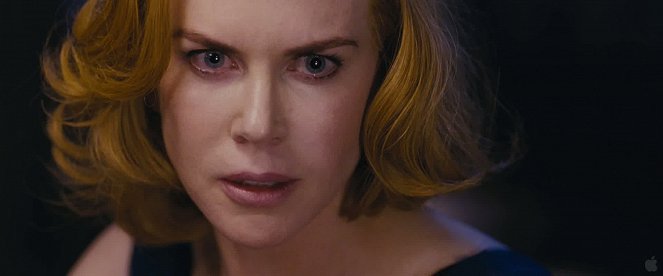Directed by:
Chan-wook ParkScreenplay:
Wentworth MillerCinematography:
Chung-hoon ChungComposer:
Clint MansellCast:
Mia Wasikowska, Matthew Goode, Nicole Kidman, Jacki Weaver, Dermot Mulroney, Alden Ehrenreich, Lucas Till, Ralph Brown, Judith Godrèche, Phyllis Somerville (more)VOD (1)
Plots(1)
After India's (Mia Wasikowska's) father dies in an auto accident, her Uncle Charlie (Matthew Goode), who she never knew existed, comes to live with her and her emotionally unstable mother Evelyn (Nicole Kidman). Soon after his arrival, she comes to suspect this mysterious, charming man has ulterior motives, but instead of feeling outrage or horror, this friendless girl becomes increasingly infatuated with him. (20th Century Fox Home Entertainment)
(more)Videos (18)
Reviews (8)
Awesome! Such a perfectly polished film is something we see only once or twice a year. It was pure joy from the first to the last minute, everything is where it should be. I won’t even criticise the script much. The movie relies on human irrationality and instinct, so the “illogical” behaviour of the characters can be easily excused. Brilliant in every way.
()
Stoker is a visually charming version of the plot involving psychopathic intruder in the family, as defined by Hitchcock in 1943 and then repeated in every detective TV series ever made. Except that this time it is presented through compelling acting performances, but without emotions, tension and credible psychology of the characters, so it doesn’t work in the slightest and ends up being completely useless.
()
What teenage American girls really dream about… Park attacks American cinema with its own weapons. In the frame for a family melodrama, whose ideology (family above all, children as a chance to make things right) is cruelly mocked, he has set a formalistically polished, thoroughly deviant film that defies categorisation in any particular genre. Beginning with the flashforward that opens the film (and indicates the dominant narrative perspective that goes beneath the surface), we are confused and led in wrong directions by various narrative devices. We learn important information sooner or later than the characters, genre conventions are used in unexpected contexts, and an equal sign could be drawn between the villains and the protagonists. With the frequent use of continuity of the shots, seemingly random details (the sole of a foot, a spider) gradually fit into the well-thought-out structure and become important motifs serving both the obvious thematic levels of the story and those that lie beneath the surface. At the same time, the occasionally disgusting details (the bursting of a blister) indicate how India perceives reality, which is probably most clearly demonstrated by her art-class painting of the inside of a vase (instead of painting the vase itself or the flowers placed in the vase). ___ Park is well aware of how certain types of scenes are constructed in Hollywood, which is why he ironically places those formulas in the foreground (the rhythmisation of a scene using a metronome, which is present in the diegetic space of the film) or circumvents them (disregard for the axis rule in the three-part dialogue scenes, the discontinuous sequencing of shots throughout the film). Through an ironic lens, we can also see the main protagonist, who has similarly morbid interests as many of her peers, but in her case it’s not mere posturing. ___ In the mould of Shadow of a Doubt, the whole film is structured as a suspenseful – albeit very ambiguous in terms of moral categories – duel between a pair of adversaries who complement and destroy each other and whose forces are only seemingly unequal. The narrative is largely organised by means of parallelism, which is behind some of the film’s most impressive scenes (e.g. the orgasmic piano duet), motivates the changes in perspective within a single long shot (either by changing the direction of movement or through more conventional refocusing) and makes us aware of moments that are important to the plot (most of the essential revelations occur on the stairs, which are “ruled” by Charlie at the beginning and by India at the end). The peak moments of the film are the two precisely built-up and rather shocking cut scenes, of which the first places sex and death on the same level and the second uniquely compresses three time planes into one. ___ From a psychoanalytical perspective, Stoker is an extremely dense film, though it occasionally resorts to naïve literalism and works with some symbols far more conspicuously than, for example, Hitchcock, who had to be more restrained in this respect due to censorship (he could perhaps have only gotten away with Charlie’s assessment of the wine accompanied by meaningful glances at India). In the shots shared with India and Charlie, the mother is a superfluous and disruptive element, which partially corresponds to the meaning of the role played by Nicole Kidman, who – despite her stardom – is more or less an extra in the film (which is to say that her performance is a violation of expectations associated with the star system) and becomes interesting only during a symptomatic reading (a reprise of the “primal scene”, which awakens India’s sexuality). ___ In the context of American production, Stoker is a refreshingly cynical film whose cohesiveness at the level of both the lower and higher narrative units is a joy to analyse again and again (because you certainly won’t exhaust all of its possibilities in one or two viewings), though you will occasionally have to turn a blind eye to the naïveté of its screenplay. 90%
()
(less)
(more)
I haven't had the pleasure of Park Chan-wook's highly acclaimed "revenge trilogy" until now, so the Stoker were a big unknown for me in terms of directorial style and poetics. I have to admit that visually it was a very well done job, involving the use of tracking shots, close-ups, no shortage of colour work and production design - just quality. The acting trio in the lead roles - Mia Wasikowska, Nicole Kidman and Matthew Goode - performed convincingly, with grace, and at times I wondered who was actually the biggest nutcase on the set. Yet, as much as I'm praising the film here now, it still didn't leave me with anything profound to remember or return to. In short, a film that is steeped in flashy visuals and acting performances at the expense of story (or so it seemed to me).
()
Stoker is living proof that you can bake a good cake even from story that is a crock of runny shit; and luckily it’s not just about individual memorable scenes (even though the shower, piano four hands and pencil sharpening will stick in your head for sure), but about the overall disturbing atmosphere, Parker’s directing superiority and the Mia/Goode duo. But Wentworth Miller should stick to prison escapes.
()



Ads